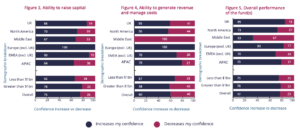Hedge Fund Confidence Drops from Highs
Posted by Colin Lambert. Last updated: January 8, 2024
Following the Q3 report that found hedge fund confidence was close to historical highs, the Q4 publication of the Hedge Fund Confidence index (HFCI) by AIMA, in association with Simmons + Simmons and Seward & Kissel, indicates that confidence levels have declined, led by firms that were the most optimistic in Q3.
The Q4 index is the result of a survey of 235 firms globally, down from 300 in Q3, representing around $2 trillion in assets, and registers an average confidence level of +15.6. This is down from +21.6 in Q3 and is below the longer-term average across the 13 readings published by AIMA, of +17.7.
The survey asks hedge funds to select their appropriate level of confidence from a range of -50 to +50, where +50 indicates the highest possible level of economic confidence for the firm over the next 12 months. When measuring their level of economic confidence, respondents are asked to consider their firm’s ability to raise capital, generate revenue and manage costs, as well as the overall performance of their fund(s).
AIMA says the Q3 score was boosted by higher numbers from hedged equity and global macro managers, but that these same strategies reported some of the lowest confidence scores of the year in Q4. Despite nearly all regions and strategies reporting a decline in scores this quarter, almost 90% of those polled recorded a positive confidence score.
On a regional basis, AIMA points out that the Q4 survey was dominated by North American and UK respondents, with lower interaction from EMEA and Asia Pacific funds. UK hedge funds have given up their lead over North American funds in Q4, thanks to an almost 10-point drop off in confidence since Q3 to +12.7.
By contrast, North American hedge funds experienced a relatively mild decline, from +19.5 to +16.6. The UK now sits below its longer-term Q4 average of +13.8, while North American funds remain above their Q4 average of +15.7.
The report says that beyond the macro environment “undoubtedly influencing sentiment” on either side of the Atlantic, the Q4 reversal is partly due to the UK’s dataset including 70% of respondents representing long-short equity managers (63% in North America). Digging deeper, the report also notes that North American respondents average a significantly higher AUM at $11.2 billion, compared to the UK’s $9.3 billion. “This disparity might contribute to the relatively smaller decrease in confidence observed in North America, as larger fund managers typically report higher confidence levels than their smaller counterparts,” the report observes.
APAC managers reported a +15.7 confidence score, meaning the region’s funds have, on the whole, remained resilient, the report states. The APAC dataset includes a much more diverse range of investment strategies including what the report says is “a small pocket” of very confident digital assets, global macro, and multi-strategy fund managers that lifted the regional score.
APAC respondents reported the greatest confidence of any region in their ability to generate revenue and manage costs but interestingly were the least confident in their ability to raise capital. Going further, the data reveals that Hong Kong-based respondents are much less confident than their regional peers in their ability to raise capital and deliver for investors over the next 12 months, demonstrating the divergence currently taking place across APAC and compared to the relatively bullish mood in Singapore.

Source: AIMA
“It is understandable why average confidence scores across all regions are more tempered going into 2024 given the underlying uncertainty and risk of radical change in the regulatory and economic environments hedge funds operate in,” suggests Tom Kehoe, global head of research and communications at AIMA. “Early indications from data providers show that, on average, hedge funds are likely to report better returns in 2023 than in 2022, reinforcing their value to investors as protectors of wealth. Overall, almost all of the hedge funds gave a positive confidence score for their economic prospects for the coming 12 months.”
Larger managers continue to show greater resiliency than their smaller peers resulting in the confidence gap widening slightly. The pool of smaller managers includes a wide variety of strategies with a greater range of confidence levels, including those at extremes of the spectrum, the report points out, adding almost all larger managers, dominated by long-short equity, and to a lesser extent global macro and multi-strategy fund managers are closely clustered in the cautiously optimistic bracket of +11 to +20 or thereabouts.
“In the analysis of factors influencing the confidence scores of fund managers, smaller managers now exhibit a higher level of confidence in their ability to generate revenue and manage costs than larger managers, while larger managers are more comfortable with raising capital,” the report states.
Q3 Optimism
For the first time in the report some trend analysis is presented, with the authors noting the increasing dataset is likely to reveal a distinct pattern in confidence levels. Initially, it observes an annual peak in confidence levels in the third quarter of each year, followed by a marked decrease in confidence in the fourth quarter. Notably, the report states, the confidence score reported for this quarter is greater than the historical average for Q4, despite the sharp decline from Q3.
Digging deeper into the data shows a rebound in confidence levels during the first and second quarters of the following year. “This recurring pattern of recovery post-Q4 confidence lows suggests a dynamic and resilient confidence landscape in the hedge fund sector, signalling adaptability and optimism among industry participants,” the report states.
It adds that this quarter’s results are notable for the wider-than-usual confidence score dispersion. Historically, the vast majority of confidence scores are clustered between +1 and +30, with an average of 87% of respondents scoring themselves in this range. This quarter, less than 80% of respondents fit in this range, with the remaining distributed on both tails.
The other dominant observable trend the report picks out is the greater-than-average representation of long-short equity funds, which historically reported lower confidence scores in Q4, compared to other strategies. This strategy accounts for 60% of respondents in this index, up from the quarterly average of 50%.
“It is reassuring to see fund manager confidence remaining consistent for this quarter, albeit with a modest decline from Q3,” says Devarshi Saksena, partner at Simmons & Simmons. “UK fund managers are having to navigate a different rhythm in the anticipated rate cuts – yet the prevailing sentiment suggests a sustained City-friendly environment as the country approaches an election year. The current market environment continues to pose significant challenges, especially for smaller managers grappling with capital raising and cost management. This quarter’s wide dispersion in confidence scores reflects the divergent fortunes of managers in a high-volatility climate, with larger entities capturing the lion’s share of capital raising success.”
Nicholas Miller, partner at Seward & Kissel, adds, “In the US, while there is significant uncertainty caused by the SEC’s new private fund adviser rules that has a dampening effect on confidence, we have seen a marked uptick in large allocations, especially into equities strategies. The primary recipients of these large allocations have been our larger clients, although we have seen an increase for more modestly-sized managers as well. Over time, we expect to see higher confidence scores as a result.”

